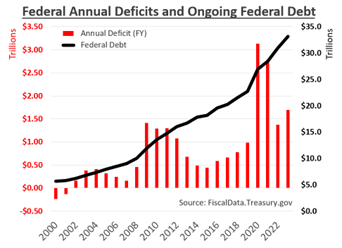
The part often ignored is that deficits need to be paid back. In fact, Keynesian economics recognizes deficit spending needs to be recouped; otherwise, perpetual deficit spending will ultimately become problematic. Fast forward to current times with a $34 Trillion debt1, an economic albatross via high-interest payments, and the eventual IOU burdened on future generations.
Politicians like to point out their opponents’ deficit demands yet eschew their own. Interestingly, spending, on one’s own initiatives is acceptable, but other initiatives are not. The reality is both political sides have contributed to this national financial situation. The solution rests in either raising taxes, reducing spending or both. It will take a long-term committed strategy without allowing pet projects, political favors, or near-term frivolous undertakings. Maybe future presidents and congresspersons should be required to attend a Spenders Anonymous meeting with a 12-step process to overcome their addiction.
In the end, the debt can only be paid by those with the ability to pay it back. Instead of saddling future generations with a $250k birth tax, why not help them put their best foot forward and minimize their financial burden for maximum return on life


Recent Comments